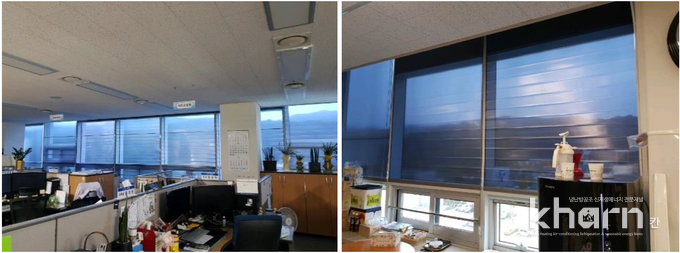Reflective Thermal Barrier System ‘DERSCHUTZ,’ Excellent Energy Saving for Cooling and Heating
Performance Assurance with SHGC 0.1, 75% Cooling Energy Savings, and 43% Heating Energy Savings
MultiFilm Korea (represented by Jeong-hye Bae) is a specialized company that balances and controls the light and heat entering buildings.
They are the first in South Korea to supply transparent blind-type heat barrier films that use plating techniques to enhance the structure, providing an external view while blocking light and heat.
The product brand supplied by MultiFilm, known as ‘DERSCHUTZ,’ means ‘the Protection’ in German.
It signifies protection of occupants from factors such as indoor temperature rise, threats to eye and skin health from direct sunlight, invasion of privacy from external views, glare from direct sunlight, and hindrance to a comfortable illuminance environment.
Additionally, it aims to reduce energy consumption for heating and cooling, thereby reducing greenhouse gas emissions and protecting the environment.
While maintaining the clearest possible windows, the film redirects visible light as well as infrared and ultraviolet rays into an energy form that can be transmitted through the glass before being converted into heat inside.
It operates by reflecting up to 88% of solar thermal energy outward, resulting in significant energy savings with up to 75% reduction in cooling energy consumption and 43% reduction in heating energy.
As a reflective solar control device, it operates on the principle of reflecting shortwave radiant energy before it converts into longwave radiant energy in the form of heat, effectively expelling it outside the building like a mirror.
While blocking solar energy from the outside is the preferred method, DERSCHUTZ provides the most effective system for indoor use when external shading installation is not feasible due to various conditions. DERSCHUTZ is installed indoors but maintains energy performance levels similar to external shading systems, all while being easy to install and maintain with high durability.
The product’s outer special metal coating has an SHGC (Solar Heat Gain Coefficient) of 0.1, reflecting up to 88% of solar energy to block its influx.
Experimental results have shown that even when installed inside the standard double-glazed windows of a glass-finished curtain wall building, it can reduce the indoor temperature by up to 6°C, resulting in a 75% reduction in cooling energy during the summer.
In addition, while reducing the visible light transmittance to 2-7%, it still provides ample natural lighting and clear views indoors.
The technology applied also eliminates reflective glare on screens such as TVs and monitors.
The blinds can be opened and closed, allowing for nighttime view preservation.
By allowing sufficient solar energy to enter during the day in winter, it prevents an increase in heating load. Especially to maximize winter heating energy savings, it is advisable to open the blinds during the day and lower them at night.
During the day, solar energy is utilized for heating to the maximum, and at night, the indoor side nano-coating of DERSCHUTZ blocks radiant heat and improves the window heat transfer coefficient.
Consequently, it has been shown that this can result in up to a 43% reduction in heating energy.

DERSCHUTZ is annually expanding its application cases, and sales are increasing as it goes viral not only among general consumers but also among public servants, workers, and visitors working in public buildings.
Especially among the numerous supply records for public buildings, the case of the new Icheon City Hall, where the entire facade of the building was completed over three years through phased application last year, is an example where energy saving and comfort were tested through a pilot application and, after confirming its effectiveness, it was expanded.
A representative from MultiFilm stated, “Ordinarily, public offices like government buildings tend to hesitate in applying innovative new technologies. However, in the case of the Icheon City Hall, the high satisfaction from the pilot application led to its expanded application through proactive administration and pioneering measures. It’s a positive example.” They added, “As a product that enables energy saving, comfort enhancement, and privacy protection all at once, it differs entirely in its operating principle from traditional blinds and offers dramatically greater effectiveness. Therefore, it’s urgent to establish standards for reflective heat-blocking systems and to set appropriate criteria for related materials and substances, particularly from the perspectives of energy saving and carbon neutrality.”
http://www.kharn.kr/news/article.html?no=19767

 한국어
한국어